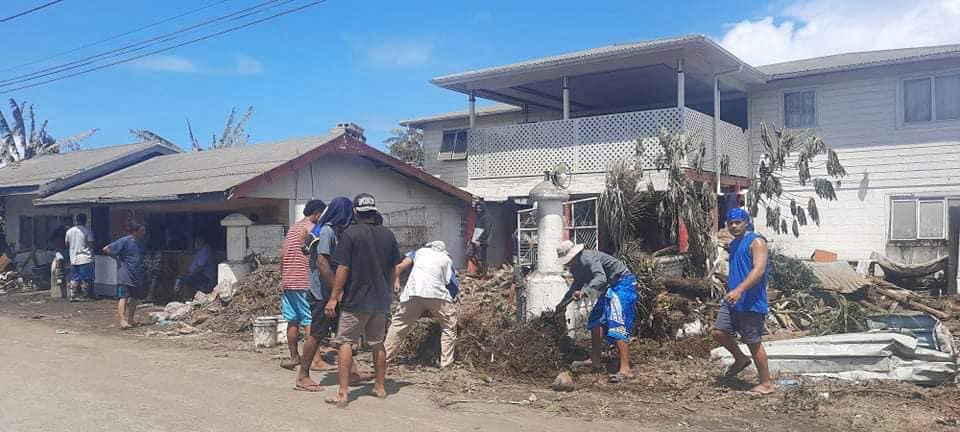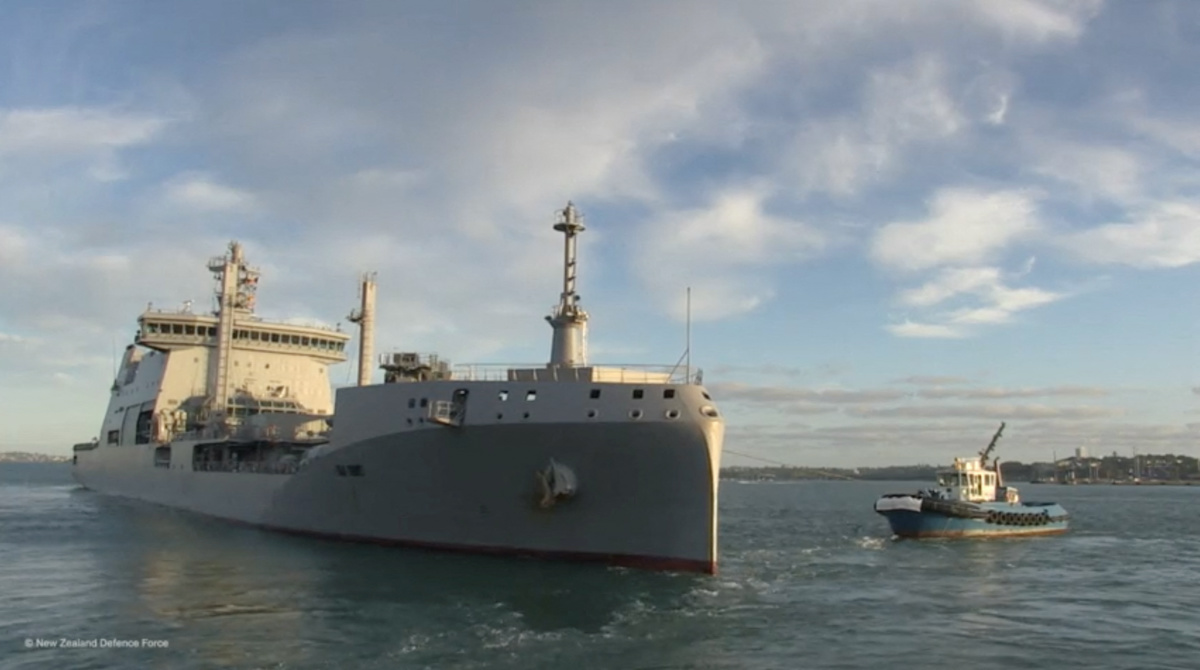Updated: 10am (AEDT)
Reuters
Tongans could finally make phone contact with their families and the outside world on Thursday five days after a massive volcanic eruption and tsunami completely cut off the Pacific island nation.
The explosion of the Hunga Tonga-Hunga Ha’apai volcano, which has killed at least three people and sent tsunami waves across the Pacific, knocked out communications of about 105,000 people on Saturday.

People clean debris following volcanic eruption and tsunami, in Nuku’alofa, Tonga, on 18th January in this picture obtained from social media on 19th January. PICTURE: Courtesy of Marian Kupu/Broadcom Broadcasting FM87.5/via Reuters.
Telephone links between Tonga and the wider world began to be reconnected late on Wednesday, though restoring full internet connectivity is likely to take a month or more according to the owner of the archipelago’s sole subsea communications cable.
Speaking to Reuters from Nuku’alofa, local journalist Marian Kupu said Tongans were in the process of cleaning up all the dust but feared they may run out of drinking water.
“Each home has their own tanks of water supply but most of them are filled with dust so its not safe for drinking,” Kupu said.
Kupu said a few villages on the Western side of Tonga were very badly hit.
“I won’t say we are expecting more deaths but as we are speaking the government is trying to fly to the other islands to check over them,” she said.
When asked if there was enough food supplies, she said: “I can say maybe we can survive for the next few weeks but I’m not sure about water.”
Meanwhile, Tongans abroad were frantically calling their families back home to ensure their safety.
“Today there’s a sigh of relief as we are able to communicate with our loved ones back home,” said John Pulu, an Auckland based Tongan, who is a television and radio personality.
“We are breathing and sleeping a little better,” he said, adding that he has been able to speak with his mother and family in Nuku’alofa who are all safe and well.
Widespread impact
The United Nations said that about 84,000 people – that is more than 80% of the population – has been badly affected by the disaster.
“They have been affected through loss of houses, loss of communication, what we understand is the issue with the water,” UN spokesman Stephane Dujarric told reporters.
The most pressing humanitarian needs are safe water, food and non-food items, he said.
“Water is really the biggest life‑saving issue. Water sources have been polluted, water systems are down.”

HMNZS Aotearoa departs to provide disaster relief and assistance to Tonga after a volcanic eruption and tsunami, from Auckland, New Zealand, on 18th January, in this still image taken from video. PICTURE: New Zealand Defence Force/Handout via Reuters.
New Zealand said Tonga, one of the few countries to be free of the new coronavirus, had agreed to receive two of its ships carrying aid and supply, despite concerns about importing a COVID-19 outbreak that would make matters worse. Vaccination against the virus is as high as 90% among Tongans.
The ships, which was carrying 250,000 litres of water along with other supplies, will arrive on Friday.
The Hunga Tonga-Hunga Ha’apai volcano erupted about 65 kilometres from the Tongan capital with a blast heard 2,300 kilometres away in New Zealand, and sent tsunamis across the Pacific Ocean.
Waves reaching up to 15 metres hit the outer Ha’apia island group, destroying all the houses on the island of Mango, as well as the west coast of Tonga’s main island, Tongatapu, where 56 houses were destroyed or seriously damaged, the prime minister’s office said.
The UN said evacuation of people from these islands is underway.
The international airport is being cleaned up and the UN hopes it will be operational on Thursday.
We rely on our readers to fund Sight's work - become a financial supporter today!
For more information, head to our Subscriber's page.
Meanwhile, an oil spill at a refinery in Peru during high waves caused by the explosion last weekend of a volcano in Tonga is an “ecological disaster,” the Peruvian government said on Wednesday.
The foreign ministry said that the oil spill had harmed animal and plant life in protected zones over a combined area of some 18,000 square kilometers around islands and fishing regions.
The spill from a tanker that was unloading crude at Spanish oil company Repsol’s La Pampilla refinery was blamed on unusually large waves after the massive undersea volcano explosion in Tonga some 10,000 kilometres away triggered tsunami warnings across the Pacific Ocean.
The ministry called on Repsol to pay for the incident.
“This is the worst ecological disaster that has occurred around Lima in recent times and has seriously damaged hundreds of fishermen’s families. Repsol must immediately compensate for the damage,” the ministry said on Twitter.
Peruvian prosecutors opened an investigation into a unit of Repsol due to the incident.
Environment Minister Ruben Ramirez met with Repsol’s officials and said that around 6,000 barrels of oil were spilled, according to the company.
Peru’s Supervisory Agency for Investment in Energy and Mining (Osinergmin) said in a statement it has ordered one of the refinery’s four terminals to be shut down until the causes of the spill are determined.
La Pampilla is Peru’s largest refinery and supplies more than half of the local fuel market.
– With KAREN LEMA, KIYOSHI TAKENAKA and JANE WARDELL.




